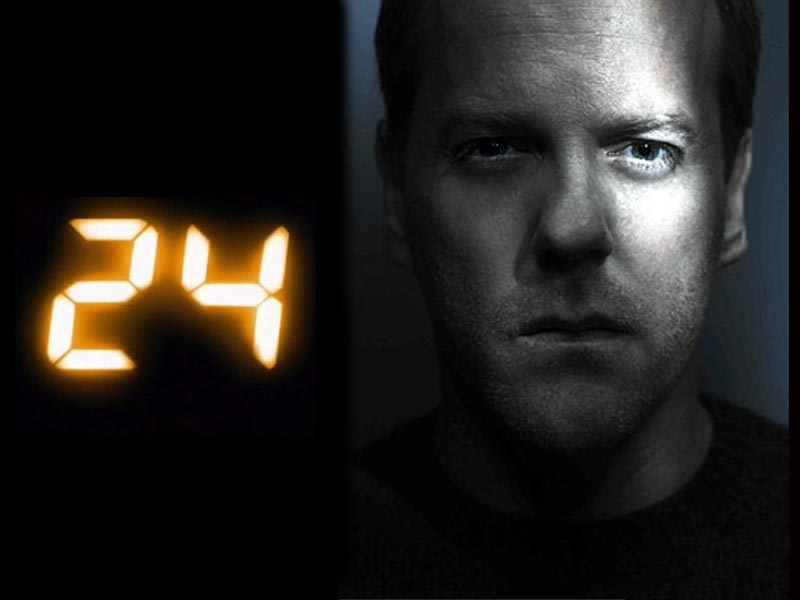Part 1 - Introduction
Jack Be Evil, Jack Be Quick:
Reflections on the Necessary Evils of 24

Ted Turnau, Ph.D.
From Minding Evil: Explorations of Human Iniquity,
ed. Margaret Sönser Breen (Amsterdam: Rodopi, 2005): 109-25.
Abstract
This paper explores the narrative world of the American action-adventure television show "24" to see how it understands evil (especially the evil done by its hero, Jack Bauer). The putatively realistic use of time in 24 actually collapses time, making questions regarding evil difficult to broach because there is no time for reflection. The reason for this collapse of time is that the world of "24" is under constant threat, making the hero’s evil excusable. Further, the hero is coded within the program as simultaneously “one of us” and omni-competent at fighting the bad guys. And Jack’s character bears a striking resemblance to post-9/11 America – wounded, but ready to do what he must to get the job done. Jack is still, by narrative fiat, the good guy, even when he does evil. The paper contains an epilogue in which the author reflects the purpose of such popular cultural analysis: to encourage moral reflection when shows short-circuit such reflection; and to understand how popular culture has taken on a quasi-religious function in our secularized cultural environment vis-à-vis our understanding of evil. Key words: evil, television, popular culture, Ricoeur, narrative, time, September 11, 2001, secularization.
1. Introduction
Searching for a show to replace the popular X-Files, America’s Fox Network, on October 30, 2001, launched 24, a show about counter-terrorist agent Jack Bauer and his quest to save a presidential candidate from assassination. Though it struggled initially in the ratings, it garnered critical praise and several awards, and it survived to draw stronger ratings in its second season and third seasons.1
In its first season, Jack Bauer (played by the ever-intense Kiefer Sutherland) was portrayed as a proficient, inventive, and at times ruthless operative who only wanted to protect his family and do his job. And he did get the job done despite impossible odds (and that is part of the fascination of the show - “How will Jack pull the rabbit out the hat this episode?”). In season two (taped after the September 11 tragedy), the show started to push ethical boundaries and explored a dark side to Jack’s personality (which had already been uncovered toward the end of season 1). Jack Bauer was a hero who, at times, had to be evil to get the job done. In this way, the show argues for a hero who must be evil by necessity (an interesting - but certainly not unprecedented - twist to our understanding of “hero” in American popular culture).
This paper seeks to explore the character of Jack Bauer and the fictive world he dwells in. The analytical method I will use is a rough and ready appropriation of the Ricoeurean concept of le monde du texte, the world of the text. Paul Ricoeur argues that for any given narrative, our attention should be drawn not to the world behind the text (for example, the world of the author), but to the world projected in front of the text. The text opens a world for the reader to inhabit. In this way the world of the text and the world of the reader intersect. The reader returns from the world of the text reconfigured, with a subtly different perspective, a different sense of time, a different identity. I will argue that once we understand the fictive (though seemingly realistic) world of the second season of 24, Jack’s embrace of necessary evil makes sense. Further, the parallels and differences between the world of the text, Jack’s character, and the world of the audience (post-9/11 America) prove illuminating as to why the show is both so effective (as entertainment) and affective (that is, in reconfiguring the audience’s identity). In this way, the world of 24 and the character of Jack Bauer - both devoid of any explicit transcendent ethical or religious framework - provide the viewer a sentimental education in the use of necessary evil, in accepting the unacceptable.
First, we will briefly examine the contours of the apparently realistic world of 24. It is not, however, the real world (surprise!), and the differences between the fictive world and the real one provide insights into the character of Jack Bauer. Second, we shall look at the character of Jack Bauer: his abilities, his character traits, and the way his experience parallels that of post-9/11 America. It is this mixture of sympathetic resonance and fictive difference that makes this show so entertaining and morally instructive (though we may differ with the content of that moral education).
Notes from this page
1 The major awards that 24 won for its first season included two Emmys (for “Outstanding Single-Camera Editing for a Series” and “Outstanding Writing for a Drama Series”), a Golden Globe (for “Best Performance by an Actor in a Television Series” for Kiefer Sutherland), and two Television Critics Association Awards (for “New Program of the Year” and “Program of the Year”). Information obtained from “Awards for ’24,’” Internet Movie Database, n.d., (27 February 2004). <http://imdb.com/Tawards?025331>.
2 In the last episode of season one, Jack mistakenly believes that the evil Serbian warlord Viktor Drezen (played way over-the-top by Dennis Hopper) had killed his daughter. Jack, in an act of pure revenge, fires bullet after bullet into a helpless Viktor Drezen, execution style.
Recent comments
7 years 25 weeks ago
8 years 37 weeks ago
9 years 2 weeks ago
9 years 2 weeks ago
9 years 5 weeks ago
9 years 13 weeks ago
9 years 15 weeks ago
9 years 41 weeks ago
10 years 2 weeks ago
10 years 32 weeks ago